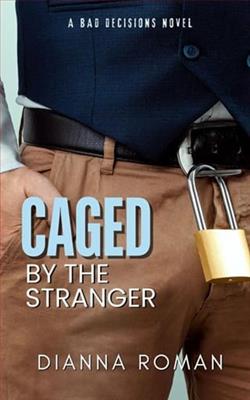Martial Peak Reviews
Dianna Roman’s Caged By the Stranger is a compelling exploration of desire, identity, and the complexities of human connection. The novel delves into the life of Charlie North, a character who initially seeks nothing more than a discreet escape from the mundanity of his everyday existence. However, what begins as a simple quest for satisfaction quickly evolves into a profound journey of self-discovery and emotional awakening.
At the heart of the novel is Charlie North, a character who is meticulously crafted with layers of complexity. Charlie is a man who appears to have it all figured out, yet beneath the surface, he grapples with self-image issues and a deep-seated fear of vulnerability. Roman does an exceptional job of portraying Charlie’s internal struggles, making him a relatable and sympathetic protagonist. His journey is not just about finding satisfaction but also about confronting his own insecurities and the societal expectations that have shaped him.
The introduction of the club Illusion serves as a pivotal moment in Charlie’s life. The club is more than just a setting; it is a catalyst for transformation. Roman uses this environment to explore themes of anonymity and liberation, allowing Charlie to shed his inhibitions and embrace his desires without judgment. The club becomes a metaphorical space where Charlie can confront his fears and desires head-on, leading to a wildfire of emotions that he never anticipated.
One of the most striking aspects of the novel is its exploration of male chastity and sexual discovery. Roman handles these themes with sensitivity and nuance, offering readers a glimpse into a world that is often shrouded in taboo. The novel challenges conventional notions of masculinity and sexuality, encouraging readers to question their own perceptions and biases. The relationship that develops between Charlie and the mysterious man behind the privacy panel is both intense and transformative, pushing Charlie to confront parts of himself that he has long ignored.
Roman also addresses the impact of a homophobic family member on Charlie’s self-perception. This subplot adds depth to Charlie’s character, highlighting the external pressures that have influenced his internal struggles. The author’s portrayal of this dynamic is both realistic and poignant, capturing the pain and confusion that can arise from familial rejection. It is through this lens that readers gain a deeper understanding of Charlie’s journey towards self-acceptance and empowerment.
The novel’s pacing is deliberate, allowing for a gradual unfolding of Charlie’s transformation. Roman’s writing is both evocative and immersive, drawing readers into Charlie’s world with vivid descriptions and emotional depth. The tension between Charlie’s desire for anonymity and his growing need for connection is palpable, creating a sense of urgency that propels the narrative forward.
In comparison to other works in the genre, Caged By the Stranger stands out for its bold exploration of themes that are often overlooked. While other authors may shy away from topics like male chastity and coercion, Roman tackles them head-on, offering a fresh perspective that is both thought-provoking and engaging. The novel shares thematic similarities with works like Fifty Shades of Grey by E.L. James, but it distinguishes itself through its focus on male vulnerability and the complexities of identity.
Overall, Caged By the Stranger is a powerful and thought-provoking novel that challenges readers to reconsider their understanding of desire, identity, and human connection. Dianna Roman has crafted a story that is both intimate and universal, offering a nuanced portrayal of a man’s journey towards self-discovery and acceptance. The novel’s impact lies in its ability to resonate with readers on a personal level, encouraging them to reflect on their own experiences and perceptions.
For those seeking a novel that delves into the intricacies of human desire and the courage it takes to embrace one’s true self, Caged By the Stranger is a must-read. It is a testament to the power of storytelling and the transformative potential of love and acceptance.
























Reviews 0
Post a Reviews: